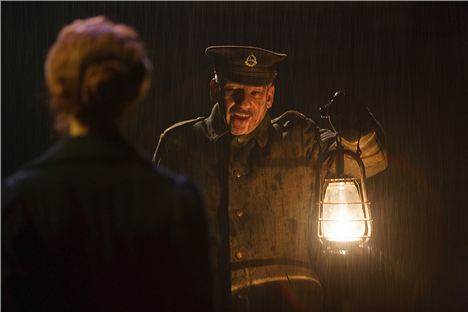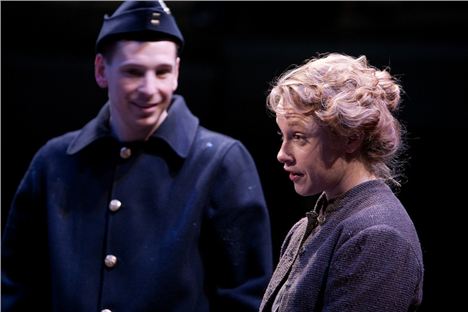The Royal Exchange’s production of Peter Whelan’s play The Accrington Pals is impressive; almost beautiful, with a real affection for the time, place and people. It is genuinely moving and contains more comedy than the subject matter with its well known bleak ending of devastating loss would suggest.
Accrington was the smallest town to recruit a ‘Pals’ Batallion’, signing up over 1,000 men in ten days with devastating results. Hundreds were killed in just twenty minutes in the early stages of the Battle of the Somme.
At the commencement of World War One Kitchener called for a volunteer army. What today would be termed ‘male bonding’, and slotted into diaries, was organic and strong in places like Accrington, naturally forged in the cotton mills, engineering works, mines and brickworks. The powerful understood this and took advantage. Recruitment would be higher, it was believed, if men could be encouraged to defend King and Country alongside their pals rather than in the company of strangers. It worked. Men signed up and went off to train with their mates rather than hang round the towns which had too often provided only narrow and inconsistent prospects. The extent of the slaughter ensured this approach brought concentrated grief to towns large and small across the land. Accrington was the smallest town to recruit a ‘Pals’ Batallion’, signing up over 1,000 men in ten days with devastating results. Hundreds were killed in just twenty minutes in the early stages of the Battle of the Somme.
It’s an immense story, the scale difficult to comprehend. Whelan’s 1982 play successfully dramatises it through a focus on two couples and their immediate neighbours.
Rain falls on a cobbled street and collects in puddles as a knocker-upper continues his rounds waking factory workers with his long pole, and May [Emma Lowndes] sets out her stall selling fruit to the factory girls on their way to work. She’s joined by Eva [Sarah Ridgeway], girl-friend to Ralph [Gerard Kearns] friend of her younger second cousin Tom [Robin Morrissey] who came to live with May’s family as a child. Friends and neighbours call by creating an affectionate picture of small town life and love.
Ralph and Tom are recruited along with many of their pals and eventually move away for further training, leaving the town populated by women who get on with their lives, pick up men’s work and wait for letters, news of troop movements and of battle outcomes.
The first act sketches the contrast between the two couples and provides plenty of humour. Ralph and Eva have a youthful, lustful, committed, unmarried relationship which Gerard Kearns and Sarah Ridgeway play to perfection, drawing in the audience with natural performances, living for the present with an air of innocence and delight in new-found love, yet aware of the impact of their actions on the future. May lives her life by strict rules of conduct and prudence, she plans and rarely strays. Emma Lowndes gets the balance right as May is torn, wanting to obey the rules yet tempted to break them in her almost-changing relationship with Tom. Robin Morrisey as Tom, a talented individual with considerable promise, slightly constrained by the familiarity and warmth of home, conveys a sense of distance from the familiar and a fear of leaving it.
Rebecca Callard brings impeccable comic timing and a superb accent to the role of ribald neighbour Sarah while Laura Elsworthy emphasises the gawkiness and occasional insight of Bertha.
Set design by Jonathan Fensom is impressive. The cobbled street is retained throughout reinforcing the sense of home even on the battlefield, The rain is utterly convincing, so much so that the actors occasionally struggle to hold their footing. Lighting is excellent and despite the dark set and drab clothing of the time allows a clear view of the action, something the Royal Exchange can struggle with. The use of mood music might not be to everyone’s taste but worked here.
Towards the end of the first act the rain returns, impressively so, bringing with it a chill of cold air and an anticipation of the eventual outcome. At the interval talk of the surprising level of humour contrasts with the expectations for the second act.
Although we know the outcome the writer manages to retain some humour. The play is not what I expected. There’s no declamatory anti-war speeches, no preaching, but there is real commitment. The play moves at times into dreams, fantasies, and illusions without any loss of the down-to-earth approach of the story. It looks more closely at the effect of events on the town, mainly the women left behind, rather than the battlefield experiences of the men. Whelen and director James Dacre present us with a complex mix of pictures constancy and change, life lived by rules alongside life lived by instinct, thwarted ambitions, lost hopes, and economic success gained through entrepreneurial drive and hard work, all underpinned by a changing role for women.
The result is a very rewarding evening: the telling of a story we already know so well in a way that engages, quietly questions, and helps us make some sense of how we’ve reached the stage we’re at today: what’s been won and what’s been lost.
There are a few minor quibbles. The scene just before the men go ‘Over the Top’ is marred by shouting: probably realistic, but undecipherable. Their final words should be heard. The soaking cobbles are great but actors can’t do a whole run in fear of breaking an ankle.
Accrington is only twenty miles away from Manchester. The Accrington Pals are strongly remembered there and understandably part of the local school curriculum. The Royal Exchange is a regional not just a Manchester theatre and this, with next year’s 100 year anniversary of the start of World War on the horizon, is an excellent choice. However it takes three trains to get to Manchester from Accrington. Perhaps The Royal Exchange could consider some extra matinees.
THE ACCRINGTON PALS continues at The Royal Exchange Theatre until Saturday 16 February 2013. To get your tickets, click here.
Follow Joan Davies on Twitter @joand7.














